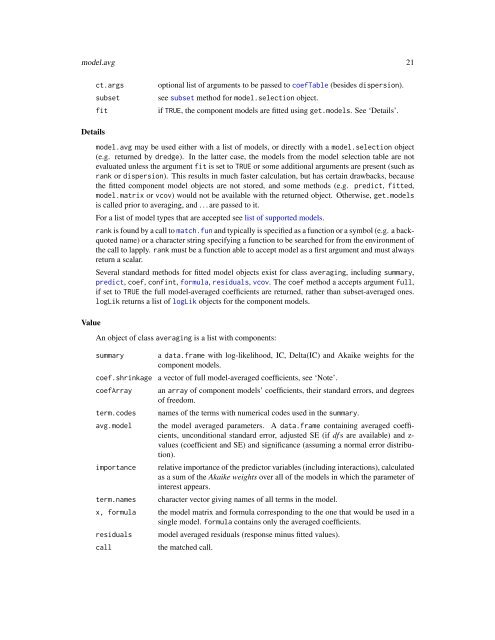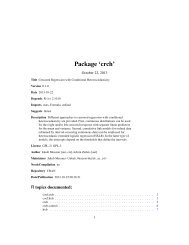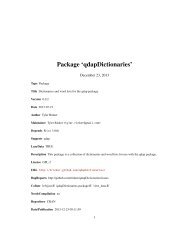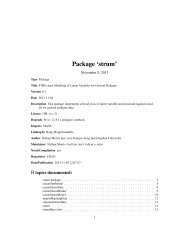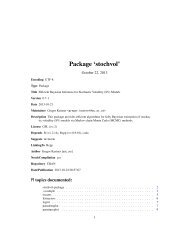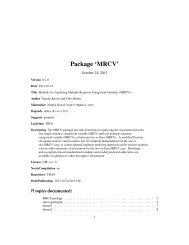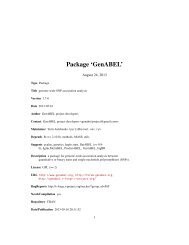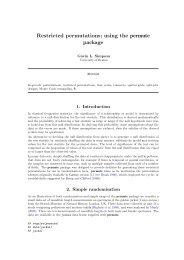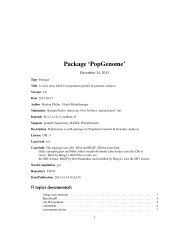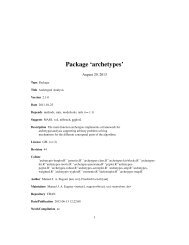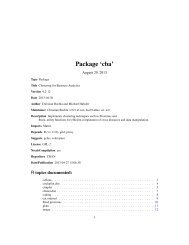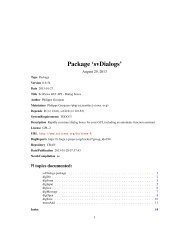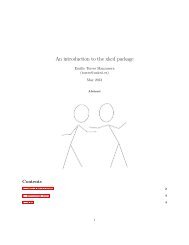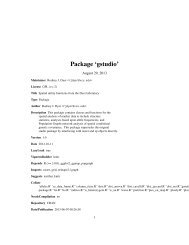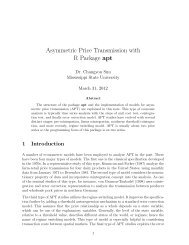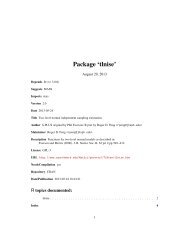You also want an ePaper? Increase the reach of your titles
YUMPU automatically turns print PDFs into web optimized ePapers that Google loves.
model.avg 21<br />
Details<br />
Value<br />
ct.args optional list of arguments to be passed to coefTable (besides dispersion).<br />
subset see subset method for model.selection object.<br />
fit if TRUE, the component models are fitted using get.models. See ‘Details’.<br />
model.avg may be used either with a list of models, or directly with a model.selection object<br />
(e.g. returned by dredge). In the latter case, the models from the model selection table are not<br />
evaluated unless the argument fit is set to TRUE or some additional arguments are present (such as<br />
rank or dispersion). This results in much faster calculation, but has certain drawbacks, because<br />
the fitted component model objects are not stored, and some methods (e.g. predict, fitted,<br />
model.matrix or vcov) would not be available with the returned object. Otherwise, get.models<br />
is called prior to averaging, and . . . are passed to it.<br />
For a list of model types that are accepted see list of supported models.<br />
rank is found by a call to match.fun and typically is specified as a function or a symbol (e.g. a backquoted<br />
name) or a character string specifying a function to be searched for from the environment of<br />
the call to lapply. rank must be a function able to accept model as a first argument and must always<br />
return a scalar.<br />
Several standard methods for fitted model objects exist for class averaging, including summary,<br />
predict, coef, confint, formula, residuals, vcov. The coef method a accepts argument full,<br />
if set to TRUE the full model-averaged coefficients are returned, rather than subset-averaged ones.<br />
logLik returns a list of logLik objects for the component models.<br />
An object of class averaging is a list with components:<br />
summary a data.frame with log-likelihood, IC, Delta(IC) and Akaike weights for the<br />
component models.<br />
coef.shrinkage a vector of full model-averaged coefficients, see ‘Note’.<br />
coefArray an array of component models’ coefficients, their standard errors, and degrees<br />
of freedom.<br />
term.codes names of the terms with numerical codes used in the summary.<br />
avg.model the model averaged parameters. A data.frame containing averaged coefficients,<br />
unconditional standard error, adjusted SE (if df s are available) and zvalues<br />
(coefficient and SE) and significance (assuming a normal error distribution).<br />
importance relative importance of the predictor variables (including interactions), calculated<br />
as a sum of the Akaike weights over all of the models in which the parameter of<br />
interest appears.<br />
term.names character vector giving names of all terms in the model.<br />
x, formula the model matrix and formula corresponding to the one that would be used in a<br />
single model. formula contains only the averaged coefficients.<br />
residuals model averaged residuals (response minus fitted values).<br />
call the matched call.


